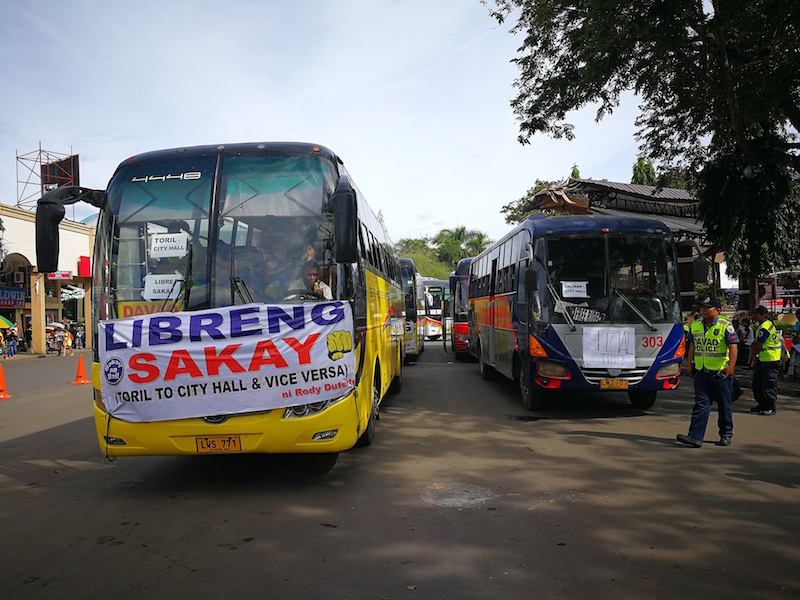DAVAO CITY (MindaNews / 16 Oct) — Malacañang suspended anew classes in all levels and government work nationwide on Tuesday, October 17, second day of the nationwide strike of the jeepney drivers and operators against the planned phase-out of the public utility vehicles (PUVs).
“May transport strike, ulan, bagyo at walang masakyan. Baka magkasakit mga kawani ng gobyerno at mga estudyante kung maulanan at walang masakyan (There’s transport strike, rain, storm and no vehicles. The government workers and the students may get sick if they get exposed to rain because they can’t get a ride),” Executive Secretary Salvador said.
 The City Government of Davao fielded buses to ferry passengers, for free, on Monday, during the nationwide transport strike. Photo from the FB Page of the City Gov/t
The City Government of Davao fielded buses to ferry passengers, for free, on Monday, during the nationwide transport strike. Photo from the FB Page of the City Gov/t
On the first day of the two-day nationwide strike, Transport in Southern Mindanao for Solidarity, Independence, and Nationalism-Pinagkaisang Samahan ng mga Transport Opereytors Nationwide (TRANSMISION PISTON) spokesperson Ricardo Baron emphasized that jeepney drivers and operators are not against modernization plan of the public transport system but the government should not allow “monopolization and corporatization” of the public transport system.
Baron said it should be the government and not the big companies that will manufacture the vehicles and manage the public transport system.
“We are fine with modernizing the public transport system for as long it will be for the common good and must not be monopolized by the corporations,” the transport leader said.
He claimed the 90 percent of operators and vehicles joined the strike but City Traffic and Transport Management Office (CTTMO) head Dionisio Abude only about 60 percent joined.
Baron said there are 17,000 jeepney drivers and operators in the city alone.
Baron said the government should also support the operators and drivers who will be affected by the planned modernization and who cannot avail of the modern vehicles, equipped with solar or electric-powered and Euro-4 compliant engines by helping them repair their old vehicles.
But the Department of Transportation (DOTr) in a statement said it’s not the corporations that will benefit from the modernization plant but the local manufacturers and the workers that will be hired, and drivers and operators who can save up bigger on fuel and maintenance cost, and commuters who will enjoy a more comfortable public transport.
The agency emphasized the need to push through with modernization, claiming that most of the public utility vehicles (PUVs) “are not safe, not comfortable, and produce significant amounts of air pollution”.
“For instance, riding through the back of jeepneys presents safety hazards for passengers. Exhaust from old and poorly maintained vehicles is a health threat not just for users, but for drivers and the public as a whole,” it added.
The agency also aims to “make public transport safe and enjoyable, reduce air pollution, and move more people efficiently” by implementing national standards and modernizing the current fleet.
Kilusang Mayo Uno (KMU) in Southern Mindanao Region spokesperson Carlo Olalo said he was wary of the proposal of the (LTFRB) to hire the displaced jeepney drivers under a contractual scheme.
He said the minimum wage will not be sufficient for the families of the drivers.
Under the LTFRB’s Omnibus Franchising Guidelines, Olalo said small operators cannot afford the prescribed 20-unit minimum requirement. He said each costs P1.2 to P1.8 million.
“Several operators and drivers will stand to lose their livelihood,” he said. He said there are 250,000 small operators and jeepney drivers in the country. (Antonio L. Colina IV / MindaNews)
